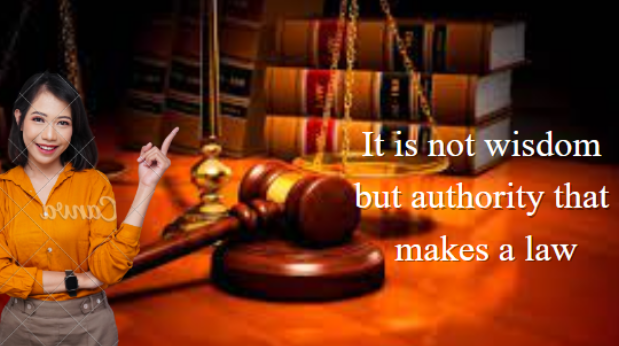It is not wisdom but authority that makes a law. t – tymoff

The saying It Is Not Wisdom But Authority That Makes A Law raises many questions in mind. Is this the correct statement? Is wisdom not necessary for making future policies and laws? What is the real relation between these two, and what are the impacts a society can face while the lawmakers are the powerful personalities rather than the eligible ones? So today, we try to overview this statement along with the need for a strong legal system and the role of lawmakers. So let’s get started.
Understanding The Quote
So before proceeding further, first look at the correct meaning of the statement, “It is not wisdom but authority that makes a law. T Tymoff.This saying reveals facts of this contemporary world where we always find people running in the battle of power, authority, and lawmaking. This saying is, in fact, a bitter reality of our world. where the powerful make their own laws or the laws that suit them instead of people who have wisdom and eligibility.
This saying of T. Tymoff is the one that we always found correct. No matter the circumstances, whether it is a heated exchange, sensational debate, political scenario, country policy, or lawmaking. This saying can be applied to almost every situation. All of us have gone through many experiences around us where wisdom is not necessary, or we can say wisdom is left behind when the powers or authority come in.
So the question arises is authority more important than wisdom? Thus to clarify this concept, we need to elaborate on the term authority. So let’s have an overview of this term.
Elaborating The Concept Of Authority

“It is not wisdom but authority that makes a law, Tymoff.” this is a viral quote that infers the interconnection of power, authority, and wisdom. It shows the main thought that not only wisdom or philosophical critical thinking leads and helps make a law. Instead, it is the authority and power that helps in making a law.
Now, you will wander around to explore more about this quote and its broader philosophy beyond thought. So, let’s go and explore it together!
Historical Glimpses Of Authority
Where the concept of authority comes from is a valid question that comes into your mind. In the Stone Age, the person who had more hunting skills and who was stronger than others was praised and liked by others. He makes a decision about where and what tricks are used to hunt. In other words, other people accepted him as their leader. So the concept of authority is very old, perhaps from the start of human life.
When moving towards the ancient period we found many examples of authority. The religious gods or priests are the main source of authority, and their orders are necessary to follow and obey.
Moreover, when we look at the emperor era, the same concept flourished there too. in that era, the emperors or the kings were the authorities of their area, and all the laws, rules, and regulations could not be made or implemented without their permission.
Right after this era, when the feudal system came in, we saw authority in its horrible form. In the feudal system, the laws were designed in order to make powerful people more powerful and bring all the fairness back. This system has no link with wisdom or fairness it is the worst user of the term authority.
Nowadays, authority is linked to one who gets the votes of the people. Such as if people trusted one party then there would be a majority of chance of having the prime minister and the government of that specific party. This person and the party have the authority to make the laws and rules of the country. This person may be a real genius or a person with wisdom or may not be. No matter whether he has wisdom, if he has authority, he can make a law.
We hardly found the role of wisdom in any of the above scenarios So, it is proved that the saying of t – tymoff is a crystal clear reality, and the concept of authority is pretty clear from the above debate. Now, the other question arises whether authority has always created bad impacts or whether it is something positive, too. Let’s look at this matter.
A Positive Example Of Authority
Authority does not always create bad impacts, it is necessary in many cases. Surely, you will be thinking about how as understanding such a complex quote is difficult. Well, let’s explore it by means of the example.
Let’s take an example.
In corporations and offices, one CEO and higher staff are always responsible for managing everything. But what if two people, two employees, started fighting in the office and didn’t stop? What can make them stop?
The answer is the higher officers. They can easily set them by explaining to them the wisdom of fight. But in case they don’t understand that these officers have the authority and the power to find them. Thus, make a law that anybody who fights in office will have the same condition.
Another positive example of authority was found during COVID-19 when there was a need for a complete lockdown. Many countries control that disease badly by using their authority, while in some countries, COVID-19 spreads badly and causes thousands of deaths when the governments don’t use their authority and take prompt measures.
Thus, authority is necessary to make fruitful on-time decisions, provide correct guidelines, share relevant and necessary information, and finally have longlasting results. In addition, authority is mandatory to structure society, implement rules and regulations, make peace, resolve conflicts, and achieve social balance.
It is very difficult to build such a harmonious and fair society, and everyone must consciously cultivate their sense of justice and critical thinking. Starting with daily life is a breakthrough point, and you can choose a small enamel pin with a quote of the law and a character who has justice engraved on it. Such dazzling accessories can bring great power and help everyone to see the world more positively.
An Example Of Weak Authority
On the other hand, weak authorities and laws bring a person into danger, conflicts, violence, and anxiety. We can take the example of Somalia, which faced weak or no authority after the collapse of the government. In that scenario, businesses stop regulating their products as they have a fear of loss.
Thus, people started fighting and killing each other for basic necessities. There was no lack of resources, but the problem was fear and disbelief. So, in that case, if there were strong authorities who took prompt action and forcefully implemented its rules then no mess was created. So, we can understand weak authorities are more dangerous than strong authorities.
Final Verdict
Thus after having a detailed overview, we can conclude that the saying “It is not wisdom but authority that makes a law. t – tymoff,” is bitter truth. Yes, it is the authority that lays down the wisdom and makes the rules and laws. Moreover our point of view there should be a balance between both authority and wisdom.






